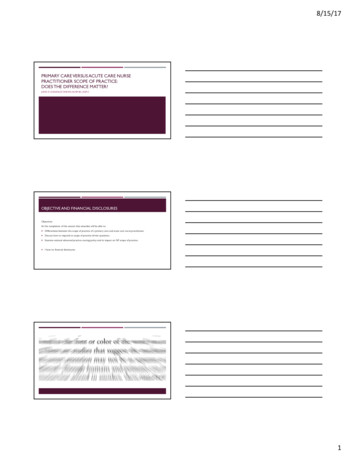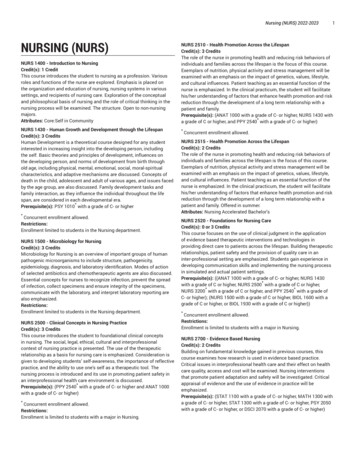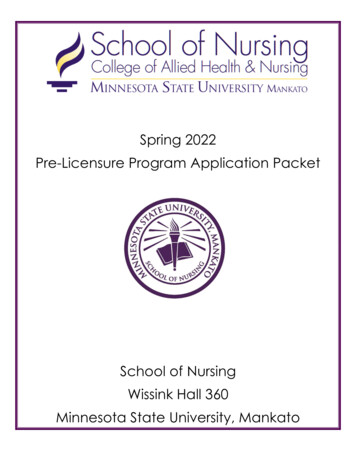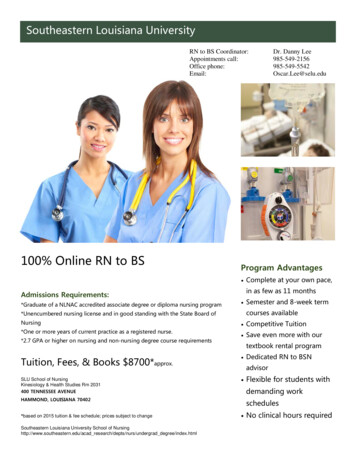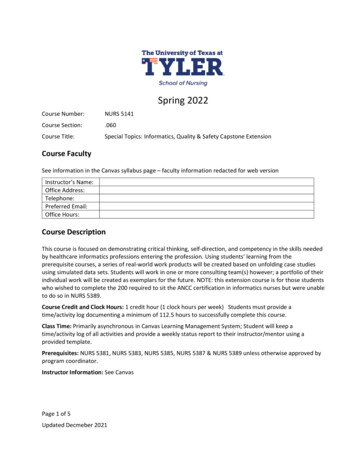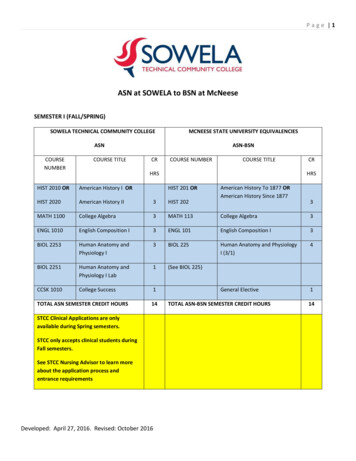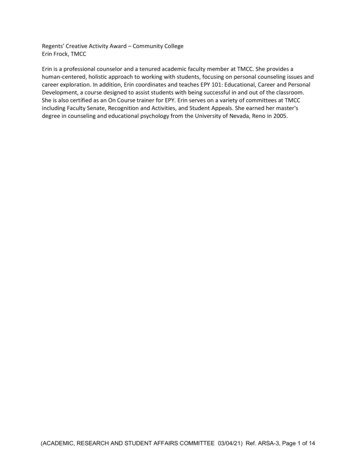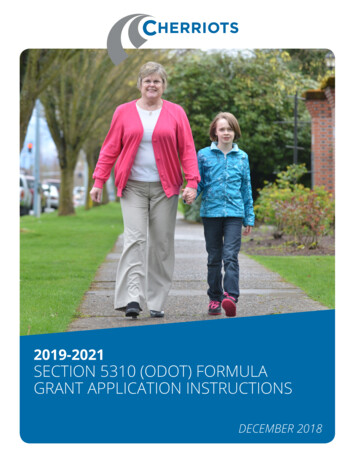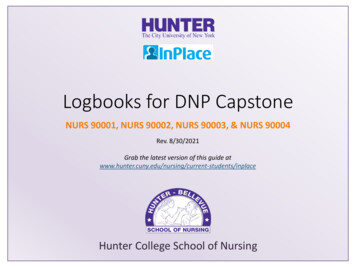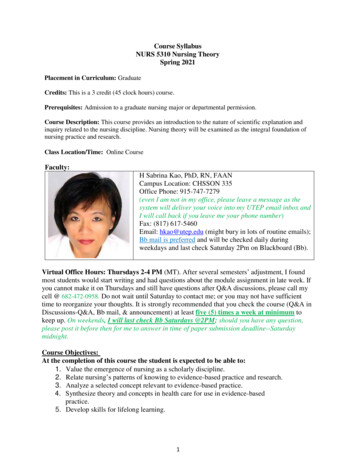
Transcription
Course SyllabusNURS 5310 Nursing TheorySpring 2021Placement in Curriculum: GraduateCredits: This is a 3 credit (45 clock hours) course.Prerequisites: Admission to a graduate nursing major or departmental permission.Course Description: This course provides an introduction to the nature of scientific explanation andinquiry related to the nursing discipline. Nursing theory will be examined as the integral foundation ofnursing practice and research.Class Location/Time: Online CourseFaculty:H Sabrina Kao, PhD, RN, FAANCampus Location: CHSSON 335Office Phone: 915-747-7279(even I am not in my office, please leave a message as thesystem will deliver your voice into my UTEP email inbox andI will call back if you leave me your phone number)Fax: (817) 617-5460Email: hkao@utep.edu (might bury in lots of routine emails);Bb mail is preferred and will be checked daily duringweekdays and last check Saturday 2Pm on Blackboard (Bb).Virtual Office Hours: Thursdays 2-4 PM (MT). After several semesters’ adjustment, I foundmost students would start writing and had questions about the module assignment in late week. Ifyou cannot make it on Thursdays and still have questions after Q&A discussions, please call mycell @ 682-472-0958. Do not wait until Saturday to contact me; or you may not have sufficienttime to reorganize your thoughts. It is strongly recommended that you check the course (Q&A inDiscussions-Q&A, Bb mail, & announcement) at least five (5) times a week at minimum tokeep up. On weekends, I will last check Bb Saturdays @2PM; should you have any question,please post it before then for me to answer in time of paper submission deadline--Saturdaymidnight.Course Objectives:At the completion of this course the student is expected to be able to:1. Value the emergence of nursing as a scholarly discipline.2. Relate nursing’s patterns of knowing to evidence-based practice and research.3. Analyze a selected concept relevant to evidence-based practice.4. Synthesize theory and concepts in health care for use in evidence-basedpractice.5. Develop skills for lifelong learning.1
6. Apply theoretical perspectives, scientific evidence, and visionary thinking to criticallyanalyze and lead complex organizational systems and implement innovative change.7. Use interpersonal, inter-professional and organizational communication and relationshipbuilding skills to create and lead highly functioning, reliable and healthy interprofessional teams.8. Combine business skills and principles, evidence-based practice, informatics, qualityand safety strategies and metrics to lead care systems for improvement of processes andoutcomes to improve health outcomes.9. Employ state, federal and global health policy(ies) to advocate for healthcare reform andimprove health outcomes for all.10. Model professionalism, integrity, ethical decision making, respect for differing points ofview in diverse populations and promoting social justice in the development of theadvanced practice role.11. Utilize research for the improvement of nursing practice and the advancement of nursingas an academic discipline.12. Ascertain the knowledge, skills, and attitudes necessary to continuously improve thequality and safety of the health care systems in which they practice through lifelonglearning.Teaching/ Learning Strategies: This is an online seminar that focuses on creating adialogue among students and faculty:1. Students will participate in on line discussions through which cooperative learning willensue.2. The course includes a range of teaching-learning strategies, including internet andliterature search, reading journal articles and selected material from texts, discussionsand other assignments related to course content.3. The faculty members serve as co-learners, facilitators and/or resource persons to guidestudents meet learning objectives. Students are expected to possess a strongcommitment to their own learning. Such a commitment includes identifying andworking to meet individual learning needs and actively participating in all of thelearning opportunities offered in the course.4. To successfully complete this online seminar, students must have regular access to thefollowing: Blackboard and related online resources; e-mail, library resources, andcomputer word processing. For information on computer requirements and technicalsupport call the Help Desk.5. BB Technical Assistance: The University of Texas at El Paso offers completetechnical information and helpdesk support at: http://issweb.utep.edu/techsupport/6. Scholarly Writing Assistance: Graduate student level writing skills are essentialand expected. The University of Texas at El Paso offers assistance with writingpapers. Contact the University Writing Center (915-747-5112) or type this link onyour browser: uwc.utep.edu. Note the links at the top of the screen, click on“consultation” and make an appointment through the web site. You will actuallylog in with your paper, and receive on-line synchronous assistance as well as ongoing consultation but you need to make the appointment as early as possible as itmay take some time (also, the tutor may not know APA format 100% correctly dueto their major in literature departments.) It is your responsibility to check theformat). Another alternative is to use commercial writing software, such as2
7.Grammarly, which does not provide as much useful feedback. Regardless, eitherone is not nursing specific and has no idea about nursing theory, you need to takeresponsibility of the content, they could only help you with grammar, words useetc.Communicate by email within the Bb is the preferred means of communicationbecause we can keep all records inside the Bb. However, if necessary for any reasonuse hkao@utep.eduStudent Responsibilities:All course work is expected and due at the time designated. Late submission of assignmentswill be considered on a case by case basis with a formal rationale (do not use busy working as areason as the workload is expected before taking the course). It is the student’s responsibility tocommunicate with the faculty regarding barriers to assignment due dates. If no advance noticeof a late submission is communicated with faculty and receive her permission, points will bededucted at a rate of 10% per day passing the due date [even you haven’t yet fully finishedyour writing in time, you may want to consider this--will the incomplete portion cost you morethan 10% of your score while submitting late?] up to two days (20%). After that, a zero will beposted in your grade book. Late submissions beyond 2 days will not be accepted without priorwritten authorization from the faculty. The student must communicate with faculty prior tomissing deadlines to receive any consideration (e.g., with proper documentation.)Academic Honesty:Students are accountable for all work, which is submitted or presented for evaluation. Whilecollaboration with others is encouraged, collaboration during any testing situation will beconsidered cheating as is submitting work, which you did not directly have a hand in developing.Use of information from publications/media productions without proper acknowledgement andcitation is considered plagiarism. Penalties for plagiarism and/or cheating will be imposedaccording to the regulation of The University of Texas at El Paso. See current UTEP graduatecatalog for specific details.Americans with Disabilities Act:If you have a disability and need classroom accommodations, please contact The Center forAccommodations and Support Services (CASS) at 747-5148, or by email to cass@utep.edu, orvisit their office located in UTEP Union East, Room 106. For additional information, pleasevisit the CASS website at www.sa.utep.edu/cass. CASS’ Staff are the only individuals who canvalidate and if need be, authorize accommodations for students with disabilities.COVID-19 Precautions:You must STAY AT HOME and REPORT if you (1) have been diagnosed with COVID-19, (2)are experiencing COVID-19 symptoms, or (3) have had recent contact with a person who hasreceived a positive coronavirus test. Reports should be made at screening.utep.edu. If you knowanyone who should report any of these three criteria, encourage them to report. If the individualcannot report, you can report on their behalf by sending an email to COVIDaction@utep.edu.For each day that you attend campus—for any reason—you must complete the questions on theUTEP screening website (screening.utep.edu) prior to arriving on campus. The website willverify if you are permitted to come to campus. Under no circumstances should anyone come to3
class when feeling ill or exhibiting any of the known COVID-19 symptoms. If you are feelingunwell, please let me know as soon as possible, and alternative instruction will be provided.Students are advised to minimize the number of encounters with others to avoid infection.Wear face coverings when in common areas of campus or when others are pre-sent. You mustwear a face covering over your nose and mouth at all times in this class. If you choose not towear a face covering, you may not enter the classroom. If you remove your face covering, youwill be asked to put it on or leave the classroom. Students who refuse to wear a face covering andfollow preventive COVID-19 guidelines will be dismissed from the class and will be subject todisciplinary action according to Section 1.2.3 Health and Safety and Section 1.2.2.5 Disruptionsin the UTEP Handbook of Operating Procedures.Please note that if COVID-19 conditions deteriorate in the City of El Paso, all course and labactivities may be transitioned to remote delivery.COVID-19 Accommodations:Students are not permitted on campus when they have a positive COVID-19 test, exposure orsymptoms. If you are not permitted on campus, you should contact me as soon as possible so wecan arrange necessary and appropriate accommodations. Students who are considered high riskaccording to CDC guidelines and/or those who live with individuals who are considered highrisk may contact Center for Accommodations and Support Services (CASS) to discuss temporaryaccommodations for on-campus courses and activities.Required Textbooks All Courses: American Psychological Association. (2019). Publication Manual of AmericanPsychological Association (7th ed.). Washington, DC: Author.ISBN-10: 1-4338-0561-8 or ISBN-13: 978-1-4338-0561-5*This is your first-semester graduate course, you need to purchase the updated 7thedition of APA Manual. All submitted written assignments and any cited data in graduateprogram should conform to the APA standards on the manual as many APA websites mayhave some unintentional errors (6th edition is inappropriate to use as there are manychanges in this updated edition.)Required Textbooks: Chinn, P. L., & Kramer, M. K. (2018). Knowledge development in nursing: Theory andprocess (10th ed.). Mosby Elsevier.ISBN: 978-0-323-53061-3 (ISBN number is to remind you not to purchase the wrongtextbook, which is nothing to do with APA format). Chapters and content of the 10thedition are different from previous edition (older edition of the book is not appropriatefor this course.) Alligood, M. R. (Ed.) (2018). Nursing theorists and their work. (9th ed.). Mosby Elsevier.ISBN-978-0-323-40224-8. Chapters of the 8th edition are different from previous edition(older edition of the book is not appropriate for this course.)Optional Textbooks: Butts, J. B., & Rich, K. L. (2018). Philosophies and theories for advanced nursingpractice (3rd ed.). Jones & Bartlett. Cody, W. K. (2013). Philosophical and theoretical perspectives for advanced practice4
nursing (5th ed.). Jones & Bartlett.Methods of Evaluation:Module1 Introduction3 Scholarly Paper2, 4, 5, 6, & 7 Short PaperTotal Possible PointsPossible Points25225150 each x 5 7501000Course components are located in Bb. There are seven modules in this course. Eachmodule contains major course content divisions with various scores (see above table). Theinstructor reserves the right to make minor edits or corrections to the syllabus, assignmentschedule, or assignment instructions. Students will be notified in advance of thesechanges.Grading Scale: A 90-100%900 - 1000 points B 80- 89%800 - 899 points C 70- 79%700 - 799 points D 60- 69%600 to 699 points F 60%below 600 pointsCredit is given in the UTEP Graduate School for the grades of A, B, and C only.Time Management:This is a 7-week course offered 100% online, in asynchronous format, virtual, personal, or telephone,and group or individual meeting times may be scheduled upon request; students may also contactfaculty via the Bb mail, UTEP Webmail system, or by cell phone at any time without appointment. Therule of thumb for time planning for a course is approximately 3 hours for every graduatecredit hour taken. This is a standard figure recommended across the board by the USuniversities. So for this course you should expect to spend, at minimum, 18 hours for the 3credit short course (3 credits x 3 hours/credit x 2 for short course 18 hours/week). Bbrecords and documents time spent within course shell so it can be tracked by your instructor.Computer Requirements: if you have a computer/software related issue, please directly contactbelow number. I am not able to answer your IT related questions. Do not use Safari as it willhave audio issue in virtual office hour, use Chrome or Firefox instead.Make sure your computer and browser software meets specifications for UTEP on-line course.Use the technical resources as needed. The UTEP Help Desk is located in the Library on the 3rdfloor, Room 300. Email to Helpdesk@utep.edu or call (915)747-HELP. Or click this link:http://admin.utep.edu/Default.aspx?tabid 74092 to locate the answer. It is recommended thatyou use secure connection to UTEP resources from remote locations through the Virtual PrivateNetwork (VPN). To set up your VPN connection access the following web eCatalog/NET VPNGlobalProtect.html5
NURS 5310 Nursing Theory Spring 2021 Placement in Curriculum: Graduate Credits: This is a 3 credit (45 clock hours) course. Prerequisites: Admission to a graduate nursing major or departmental permission. Course Description: This course provides an introduction to the nature of scientific explanation and inquiry related to the nursing discipline.

